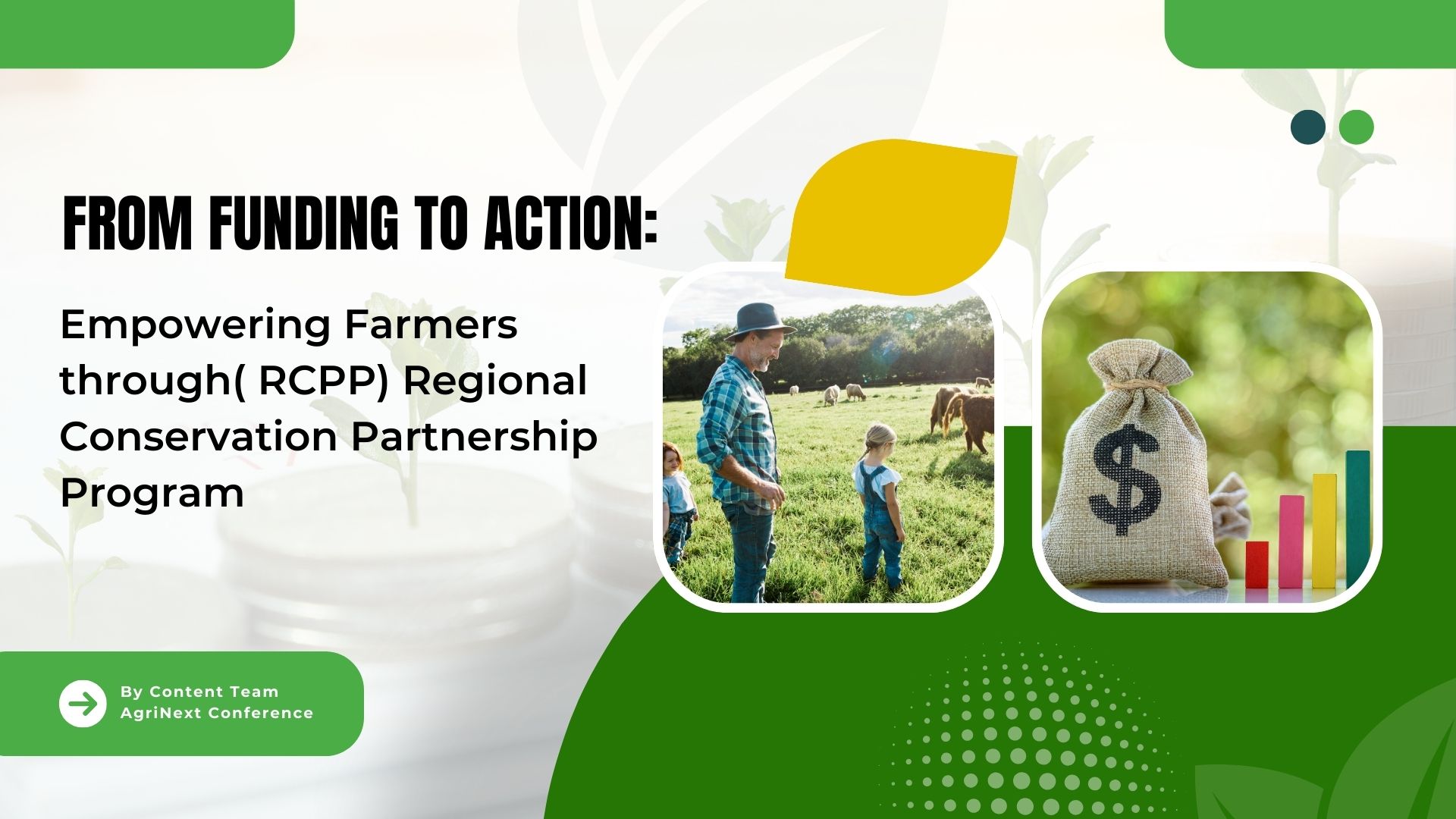
Introduction
In a groundbreaking initiative, the United States Department of Agriculture (USDA) has recently allocated $1.5 billion for the fiscal year 2024 to the Regional Conservation Partnership Program (RCPP) — tripling its 2023 funding. This substantial investment is designed to promote climate-smart agriculture across the United States and to expand the scope, scale, and diversity of conservation programs. Realizing the full potential of this funding requires intentional action and collaboration across the agricultural ecosystem.
In this blog, we will explore the objectives, key components, and impact of the RCPP, highlighting how this comprehensive program is set to transform the agricultural landscape .
Objectives of the RCPP
The RCPP seeks to achieve several key objectives that align with the USDA’s broader mission of promoting sustainable agriculture and environmental stewardship:
Enhance Soil Health: Promote practices that improve soil structure, increase organic matter, and enhance nutrient cycling.
Improve Water Quality: Implement measures to reduce agricultural runoff, enhance water use efficiency, and protect water resources.
Increase Biodiversity: Foster habitats that support diverse plant and animal species, improving ecosystem resilience.
Mitigate Climate Change: Support the adoption of practices that reduce greenhouse gas emissions and increase carbon sequestration.
Support Economically Viable Agriculture: Ensure that conservation efforts also contribute to the economic sustainability of farms and rural communities.
Key Components of the RCPP
The RCPP is built around several core components that facilitate its implementation and effectiveness:
Partnerships:
Collaborative Projects: RCPP projects are developed and implemented through partnerships between farmers, ranchers, private companies, non-profits, and government agencies. These collaborations leverage diverse expertise and resources to address regional conservation challenges effectively.
Financial and Technical Assistance: The USDA provides both financial and technical assistance to partners, ensuring they have the necessary support to achieve conservation goals.

Project Types
RCPP Classic: Partners develop and propose projects that address specific conservation needs in their regions. These projects receive funding and support based on their potential impact and suitability.
RCPP Alternative Funding Arrangements (AFAs): These arrangements allow for more innovative and flexible approaches to conservation, encouraging creative solutions and new partnerships.
Priority Resource Concerns:
Projects focus on addressing key resource concerns such as soil erosion, water quality degradation, inadequate habitat for fish and wildlife, and air quality issues.
Monitoring andEvaluation:
Outcome-Based Measurement
The effectiveness of RCPP projects is checked carefully through regular monitoring and evaluation, making sure that conservation practices result in real environmental improvements.
Adaptive Management: Ongoing assessment allows for adjustments and improvements in project implementation, enhancing overall effectiveness.
Impact of the RCPP
The increased funding for the RCPP in 2024 is expected to significantly amplify its impact across the United States:
Expansion of Conservation Practices: The increased budget will allow for the implementation of a greater number of conservation practices on more acres of agricultural land.
Broader Reach and Inclusion: More diverse and widespread participation from different regions and types of agricultural operations will enhance the program’s overall effectiveness.
Innovation and Flexibility: The focus on alternative funding arrangements will encourage innovative approaches to conservation, potentially leading to breakthroughs in sustainable agriculture practices.
Climate Resilience: By promoting climate-smart agriculture, the RCPP will contribute to building more resilient agricultural systems capable of withstanding climate change impacts.
Success Story:
“Minnesota’s Lakes are Cleaner This Summer Thanks to Farmers’ Conservation Efforts”.
By Jacob Gustin
In a shining example of the positive impact of the Regional Conservation Partnership Program (RCPP), Minnesota’s lakes are noticeably cleaner this summer, thanks to the diligent conservation efforts of local farmers. This success story highlights how effective collaboration and the adoption of sustainable practices can lead to significant environmental benefits.
Background
Minnesota, known for its numerous lakes, has long faced challenges related to agricultural runoff and water quality. Fertilizers and pesticides from farms often end up in nearby water bodies, causing nutrient pollution and algae growth that harm aquatic ecosystems and affect water quality.
Farmers’ Conservation Efforts
Through the RCPP, Minnesota farmers have been provided with financial and technical assistance to implement conservation practices designed to reduce runoff and improve soil health. Key measures include:
Buffer Strips: Establishing vegetative buffer strips along waterways to filter out sediments and nutrients before they reach the lakes.
Cover Crops: Planting cover crops to improve soil structure, enhance water infiltration, and reduce erosion.
Nutrient Management Plans: Developing and sticking to nutrient management plans that optimize fertilizer use and minimize excess application.
Results and Impact
The concerted efforts of Minnesota farmers, supported by RCPP funding and guidance, have led to measurable improvements in water quality. This summer, many of the state’s lakes are cleaner, with reduced levels of nutrient pollution and fewer occurrences of harmful algae blooms. These improvements not only benefit the environment but also enhance recreational opportunities and the overall quality of life for local communities.
Minnesota’s success story underscores the importance of the RCPP and similar initiatives in promoting sustainable agricultural practices. By empowering farmers with the tools and knowledge needed to protect natural resources, such programs demonstrate that agricultural productivity and environmental stewardship can go hand in hand. The cleaner lakes in Minnesota are a testament to what can be achieved through collaboration and dedicated conservation efforts.
Reference
Minnesota Board of Water and Soil Resources’ (2021) One Watershed, One Plan Guidebook.
The Regional Conservation Partnership Program (RCPP) is a specific initiative by the United States Department of Agriculture (USDA) tailored to the agricultural and environmental needs of the United States. However, the principles and strategies behind RCPP can be adapted to other countries aiming to address similar conservation and agricultural challenges. Here’s how:
Relevance of RCPP Principles to Other Countries
Collaborative Approach:Countries can adopt the collaborative approach of RCPP, encouraging partnerships between farmers, government agencies, non-profits, and private companies to address regional conservation issues.
Focus on Key Resource Concerns: Identifying and addressing key resource concerns such as soil health, water quality, and biodiversity can be a universal strategy. Each country can tailor these concerns to their specific environmental and agricultural contexts.
Financial and Technical Assistance
Providing financial incentives and technical support to farmers and other stakeholders can be adopted globally. This support can help implement sustainable practices and technologies.
Monitoring and Evaluation:Implementing robust monitoring and evaluation frameworks to assess the effectiveness of conservation projects can be beneficial worldwide.
Promoting Innovation:Encouraging innovative approaches to conservation, such as alternative funding arrangements and flexible project designs, can be relevant to countries looking to develop new solutions to their unique challenges.
Examples of Similar Programs in Other Countries
European Union’s Common Agricultural Policy (CAP)
The CAP includes measures to promote sustainable agriculture and rural development across EU member states. It focuses on environmental stewardship, climate action, and support for rural communities.
Australia’s National Landcare Program
This program supports sustainable land management practices and community-driven conservation projects, emphasizing soil health, water quality, and biodiversity.
India’s National Mission for Sustainable Agriculture (NMSA)
NMSA promotes sustainable agricultural practices, including soil health management, water conservation, and climate-resilient farming techniques.
Canada’s Agricultural Greenhouse Gases Program (AGGP)
AGGP funds projects that aim to reduce greenhouse gas emissions from agriculture, promoting practices that enhance carbon sequestration and improve overall sustainability.
Conclusion
The USDA’s $1.5 billion investment in the Regional Conservation Partnership Program represents a significant step forward in advancing sustainable agriculture and conservation in the United States. By fostering collaboration, innovation, and targeted action, the RCPP is poised to make substantial contributions to soil health, water quality, biodiversity, and climate resilience. As the program expands its reach and variety of conservation efforts, it will play a crucial role in ensuring the long-term sustainability and productivity of American agriculture.
While the RCPP is specifically designed for the United States, its principles and strategies are highly adaptable and relevant to other countries aiming to promote sustainable agriculture and conservation. By fostering collaboration, providing targeted support, and emphasizing innovation and adaptive management, countries around the world can address their unique environmental and agricultural challenges more effectively.
The AgriNext Awards Conference & Expo
The AgriNext Awards Conference & Expo is a premier event dedicated to advancing agricultural technology and innovation. Scheduled for November 13-14, 2024, in Dubai, it brings together industry leaders, innovators, and experts to discuss the latest trends and solutions in agriculture. The conference features a diverse lineup of speakers and exhibitors who focus on cutting-edge topics such as precision agriculture, vertical farming, blockchain technology, and sustainable practices.
Signup For AgriNext Conference Newsletter

